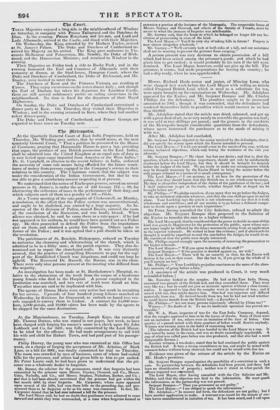At the Mansionhouse, on Tuesday, Joseph Kaye, the servant of
Mr. Thomas Dutton, who was stated in our paper, last week, to have been charged with forging his master's name to a check upon Sir John Lubbock and Co. for 348/., was fully committed by the Lord Mayor, to be tried for the offence. He had made arrangements to sail with his wife and child for Hobart Town, and had paid part of his passage- money.
Philip Hervey, the young man who was examined at this Office last ♦ veek, on a charge of forging the acceptance of Mr. Arboine, of Mark Lane, to a bill for 3001., was finally committed for trial on Thursday. The room was crowded by men of business, some of whom had cashed bills for the prisoner, and others had given bills to him to get cashed. Sir Peter Laurie said, he had been given to understand that the pri. soner was a wholesale dealer in forgeries.
Mr. Bennet, the solicitor for the prosecutors, stated that forgeries had been committed by the prisoner upon Messrs. Gurney, Overend, and Co., Messrs. Coles, Nicholls, and Co., and Messrs. Stephen, Nicholson, Barber, and Co. ; and that it had been already ascertained that the prisoner had got within the last month 6001. by sheer forgeries. Mr. Carpenter, whose name appeared 'upon several of the bills, had seen those bills on the preceding day, and pro- nounced them to be forgeries so far as his name was concerned. In fact, Mr. Carpenter denied that he bad ever indorsed a bill for the prisoner.
The Lord Mayor said, he had no doubt that gentlemen were ashamed to come forward and admit they were overreached, at a time when forgeries formed so extensive a portion of the business of the Metropolis. The respectable house of Messrs. Gurney and Overend, and others of the Society of Friends, must be aware to what the increase of forgeries was attributable.
Mr. Gurney said, that the house to which he belonged no longer felt any he- sitation at prosecuting in cases of the kind.
The Lord Mayor—" You'll be very shy of taking bills in future? Forgery is now almost altogether wholesale."
Mr. Gurney—" We'll certainly look at both sides of a bill, and our assistance shall not be wanting to prevent the prisoner from escaping."
A person present was very desirous to obtain possession of a bill which had been seized among the prisoner's goods, and which he had given him to get cashed ; it would probably be his ruin if the bill were detained. The Lord Mayor, however, could not give up the bill. The prisoner, it seems, had made preparations for leaving the country; he had a ship ready, when he was apprehended.


















 Previous page
Previous page